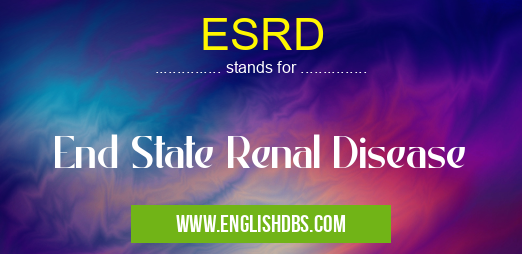What does ESRD mean in DISEASES
End Stage Renal Disease (ESRD), also known as chronic kidney failure, is a progressive condition in which the kidneys gradually lose their ability to function. When the kidneys fail, they can no longer adequately filter waste products and excess fluid from the blood, leading to a buildup of toxins and fluid in the body.

ESRD meaning in Diseases in Medical
ESRD mostly used in an acronym Diseases in Category Medical that means End State Renal Disease
Shorthand: ESRD,
Full Form: End State Renal Disease
For more information of "End State Renal Disease", see the section below.
Meaning in MEDICAL
In the medical context, ESRD refers to the irreversible and permanent loss of kidney function. It is typically caused by progressive damage to the kidneys over time, often due to underlying conditions such as:
- Diabetes
- Hypertension (high blood pressure)
- Glomerulonephritis (inflammation of the kidney's filtering units)
- Polycystic kidney disease
- Lupus
Full Form
The full form of ESRD is End State Renal Disease. It is a term used to describe the final stage of chronic kidney disease, when the kidneys have lost virtually all of their function.
Essential Questions and Answers on End State Renal Disease in "MEDICAL»DISEASES"
What is ESRD?
End Stage Renal Disease (ESRD) is a chronic condition in which the kidneys permanently lose their ability to function adequately. The kidneys are responsible for filtering waste products from the blood and regulating fluid balance. In ESRD, the kidneys fail to perform these functions, leading to a buildup of toxins in the blood and fluid retention.
What causes ESRD?
There are various underlying conditions that can lead to ESRD, including:
- Diabetes
- High blood pressure
- Glomerulonephritis (inflammation of the kidney filters)
- Polycystic kidney disease
- Kidney infections
- Obstructive uropathy (blockage in the urinary tract)
What are the symptoms of ESRD?
Symptoms of ESRD may include:
- Fatigue
- Weakness
- Nausea and vomiting
- Loss of appetite
- Swelling in the hands, feet, and face
- Changes in urine output
- High blood pressure
- Shortness of breath
- Confusion
How is ESRD treated?
Treatment options for ESRD include:
- Dialysis: A procedure that filters waste products from the blood using a dialysis machine.
- Kidney transplant: A surgical procedure to replace the failing kidneys with a healthy kidney from a donor.
- Conservative care: Managing symptoms and preventing further kidney damage without dialysis or transplant.
What is the prognosis for ESRD?
The prognosis for ESRD depends on the severity of the condition and the treatment received. With proper management, individuals with ESRD can live full and active lives. However, ESRD is a serious condition that requires lifelong medical care and monitoring.
How can I prevent ESRD?
While some causes of ESRD cannot be prevented, there are steps you can take to reduce your risk, such as:
- Controlling blood sugar levels if you have diabetes
- Managing blood pressure
- Avoiding excessive use of pain relievers
- Getting regular checkups with your doctor
Final Words: ESRD is a serious condition that requires ongoing medical treatment, such as dialysis or kidney transplantation. Early detection and management of underlying kidney conditions are crucial to prevent or delay the progression to ESRD.
